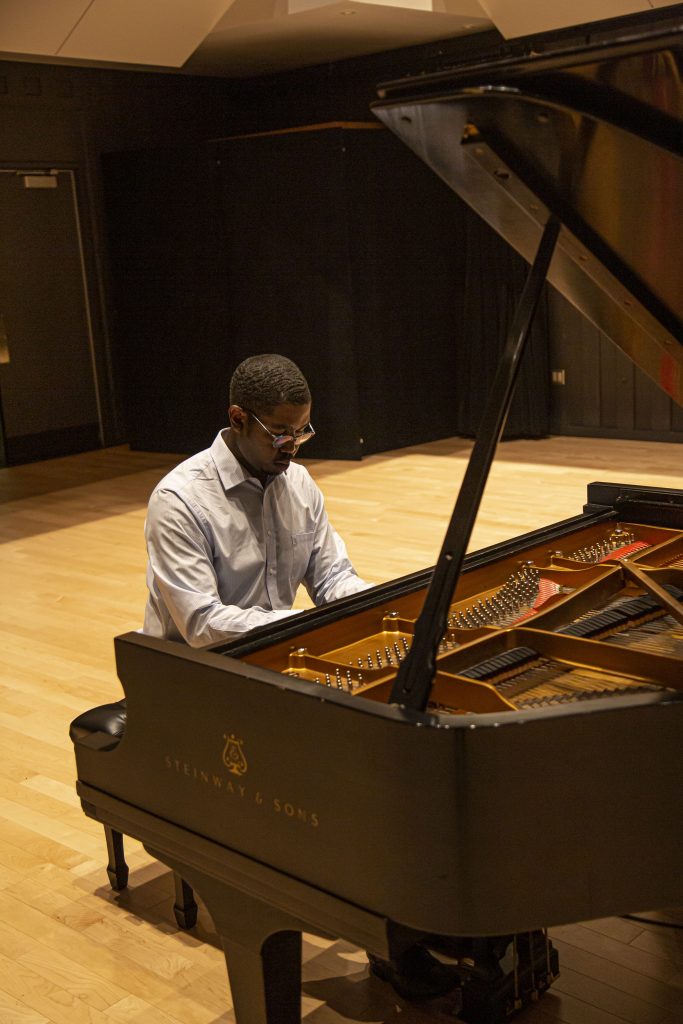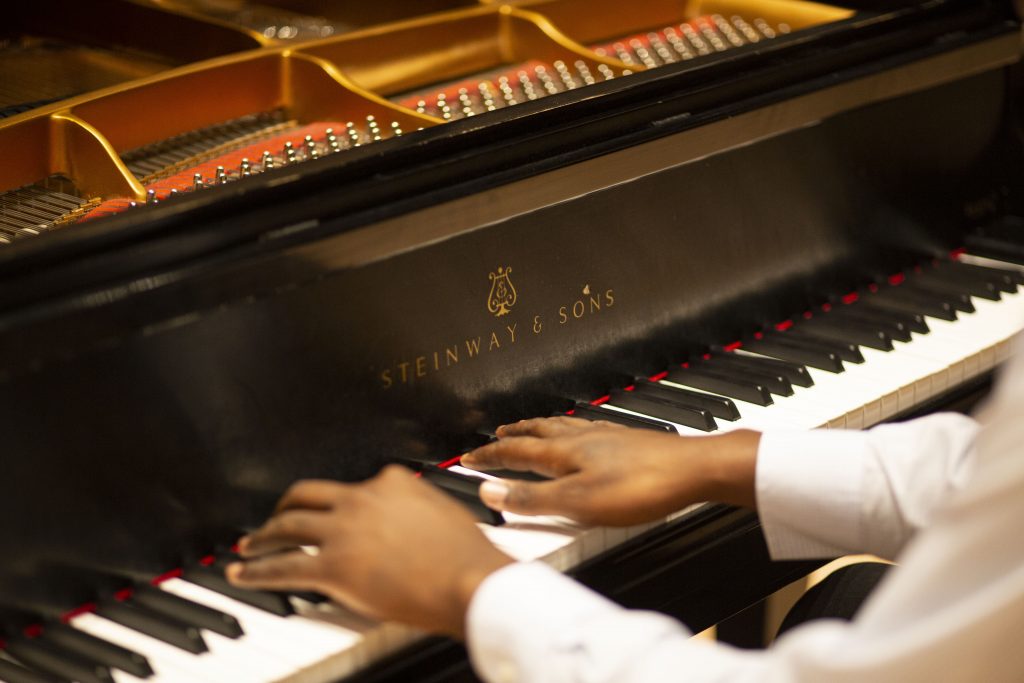‘At the end of the day, there was still music in my mind:’ McMaster pianist on performing in a pandemic

McMaster University piano and music cognition student Joel Affoon (Photo by Colin Czerneda)
Earlier this year, the McMaster Chamber Orchestra released a video recording of the second movement of Mozart’s Piano Concerto No. 20 in D minor (K. 466), featuring soloist Joel Affoon on the piano. We caught up with him to find out more about his musical journey, and how he’s feeling about getting to perform in front of an audience again.
Tell me about yourself
I’m in my fifth year. I came back for an extra year because of COVID. I’m trained as a classical pianist – I’ve been playing the piano for 20 years, and I also play saxophone.
As a music student here, we have to fulfill two ensemble requirements. Being a pianist it’s hard to find an ensemble, but thankfully because I can play saxophone I’ve played in the concert band for four years. Two years ago, I had the opportunity to start working with the orchestra.
What was it like to be part of the ‘Slo Mo’ video?
It was a lot of work! Dr. Woolhouse, the conductor, approached me in September and asked me if I would be willing to do the concerto with the orchestra for the online performance. I initially thought that it would be a good opportunity — mostly because my first performance with an orchestra would be stressful if it were in person!
It was an interesting experience — in lessons with my instructor, she kept reminding me that when you’re playing with an orchestra you need to remember that the piano is a large instrument, and it mirrors the instruments in the orchestra. For example, if you’re playing something in the low bass register, you need to think about what instrument would play that in the orchestra and how it would play that.
With that in mind it took me a couple of months to get the music really down. Dr. Woolhouse told me that although it may seem easy at first, I shouldn’t let the energy lag — I should keep pushing to make it as good as possible. He was right.
When it came down to sitting down and getting the video and the audio done, it was much more work than I’d anticipated. Because we weren’t in person, there wasn’t a conductor there to tell everyone how fast or how slow to go — everyone had to somehow follow the pianist! We used a guide track, and then I used headphones so I could follow the guide track while I was playing and not deviate from the tempo.
I’ll be honest — it took me a couple of tries to get something that was good! That’s part of the problem with being online — you can go back, listen and edit, while if you’re in person, what you play is what’s out there.
The piece is normally around eight minutes, but the recording is only six minutes, because we only did one of the repeats in the movement. We were trying to capture an online audience and keep them for the duration of the video, and we didn’t want to lose them.
How did you get into piano and music, and what led you to McMaster?
When I was around three years old — I was born and raised in Toronto, but later moved away — I was walking through a mall with my mom. There was a booth for the Ontario Conservatory of Music, and they were recruiting students. They told my mom that, at three years of age, my fingers looked like they would play a piano — so my mom enrolled me. They were willing to start me that young — usually they start kids a little older, but I started early.
I talked to my mom a couple of years ago about what kept me in piano, because I know a lot of parents have trouble keeping their kids in lessons.
My mom told me that she gave me the liberty as a child that if I wanted to pursue music and continue piano, I should do it — she wasn’t going to force me to stay in it if I didn’t want to, and she wasn’t going to tell me to leave if I wanted to be in it.
I did have some times when I stopped playing — when I was in grade six to eight, I was playing rep basketball. I’m 6’4” so people were trying to recruit me at that age to play sports, not music. I explored those options, but at the end of the day, there was still music in my mind.

When I got to high school, I got into band class, and I decided I was going to learn another instrument. My band teacher was very supportive — she knew I was a pianist first, but would try and encourage me to come to band practice (going every other week when I had football practice). I couldn’t understand why she always wanted me to come out, but I think it helped me find and continue my love for music.
I took some time off from high school, because I wasn’t sure what I wanted to study — I took two years off, then I applied to McMaster as a mature student.
I auditioned for McMaster and York, and felt very confident that I wanted to come to Mac because of the music cognition program. At the time, it was the only program of its kind in North America.
The community at McMaster was like nothing I’d experienced before — you could sense the difference in the community, and that left an impression on me. You meet three professors on your audition day, and it was great to meet so many of the faculty — that isn’t always the case at other schools on audition day. That’s what brought me here.
What kinds of things do you like about music cognition?
Since the music cognition is partly the study of how young children perceive music, what’s really interesting to me is why we have different tastes in music. Not to say that we’ve figured those things out, but we’re at least having those discussions.
Right now I’m branching off into a different realm — I’m interested in the performer’s mind, either what goes on in the mind during performance, or how a musician is able to play for so long without injuring themselves.
The complete Mozart concerto I played is between 20 and 23 minutes, depending who plays it. I’m interested in why some musicians can play that with no problem, and why some injure themselves – and how can we get them back to where they were before they had the injury.
The music cognition program got me to think about these things. When I started at McMaster, I had no idea that there’s a whole field of performing arts medicine that studies performers in all disciplines — theatre, art, dancing. What do our bodies do when we do these activities?
How does it feel to be slowly getting back to performing in person?
Last year, I played at the McMaster service awards and got to play the Steinway in the concert hall. There was nobody there, and I was playing towards a screen – but it still felt good to share music with people again.

I’m going to be doing a recital at the end of the year — I’m hoping to work on a reduction of the Mozart concerto and play it with string quartet for piano, and I’m looking forward to that.
I’m trying to see if there are any other performance opportunities available. Before COVID, we ran student concerts once a month, and if that starts up again, I’d be on that list as soon as they make it available.
What do you listen to when you choose to listen to music?
I listen to either classical music or jazz. In high school I played in the Etobicoke Jazz Band, and we played music that was early 50s and 60s jazz, and that got me interested in big band music. Other than that, I listen to piano music, or piano and orchestra music.
What’s next for you?
I’m applying to grad school with the hopes of going into piano performance or piano pedagogy — because I’m interested in performers’ rehabilitation. I want to know what it’s like to go through high-intensity music training and understand what happens at that level. I want to know how to teach and how to approach the instrument in a healthy way.
For me, one of my mottos going through the program at McMaster is that you get out what you put into it. If you don’t put in the work, or you don’t show the professors that you’re willing to do or play things, you won’t get opportunities to do that.


